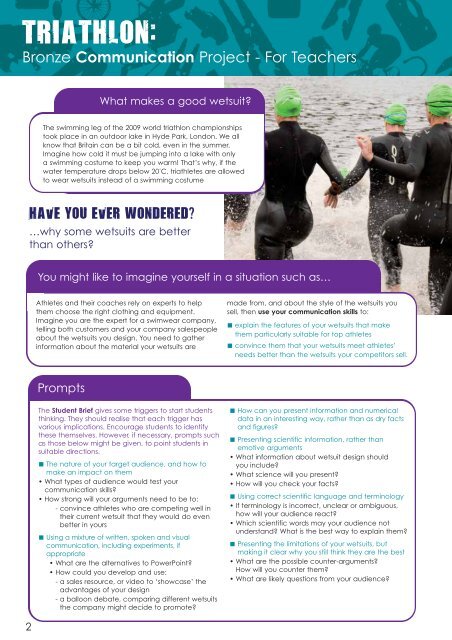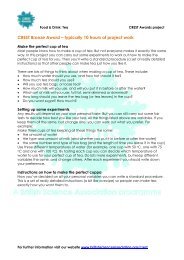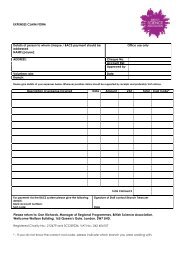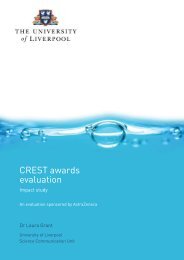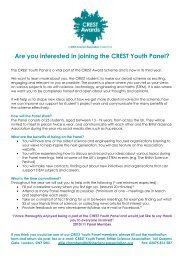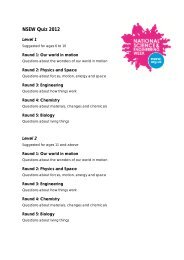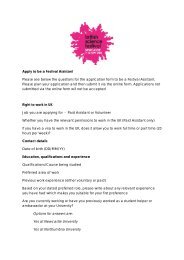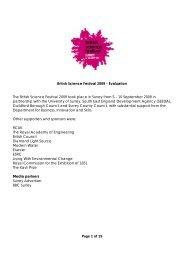Triathlon (communication project) - British Science Association
Triathlon (communication project) - British Science Association
Triathlon (communication project) - British Science Association
You also want an ePaper? Increase the reach of your titles
YUMPU automatically turns print PDFs into web optimized ePapers that Google loves.
<strong>Triathlon</strong>:<br />
Bronze Communication Project - For Teachers<br />
What makes a good wetsuit?<br />
The swimming leg of the 2009 world triathlon championships<br />
took place in an outdoor lake in Hyde Park, London. We all<br />
know that Britain can be a bit cold, even in the summer.<br />
Imagine how cold it must be jumping into a lake with only<br />
a swimming costume to keep you warm! That’s why, if the<br />
water temperature drops below 20 o C, triathletes are allowed<br />
to wear wetsuits instead of a swimming costume<br />
Have you ever wondered?<br />
…why some wetsuits are better<br />
than others?<br />
You might like to imagine yourself in a situation such as…<br />
Athletes and their coaches rely on experts to help<br />
them choose the right clothing and equipment.<br />
Imagine you are the expert for a swimwear company,<br />
telling both customers and your company salespeople<br />
about the wetsuits you design. You need to gather<br />
information about the material your wetsuits are<br />
made from, and about the style of the wetsuits you<br />
sell, then use your <strong>communication</strong> skills to:<br />
explain the features of your wetsuits that make<br />
them particularly suitable for top athletes<br />
convince them that your wetsuits meet athletes’<br />
needs better than the wetsuits your competitors sell.<br />
Prompts<br />
The Student Brief gives some triggers to start students<br />
thinking. They should realise that each trigger has<br />
various implications. Encourage students to identify<br />
these themselves. However, if necessary, prompts such<br />
as those below might be given, to point students in<br />
suitable directions.<br />
The nature of your target audience, and how to<br />
make an impact on them<br />
• What types of audience would test your<br />
<strong>communication</strong> skills?<br />
• How strong will your arguments need to be to:<br />
- convince athletes who are competing well in<br />
their current wetsuit that they would do even<br />
better in yours<br />
Using a mixture of written, spoken and visual<br />
<strong>communication</strong>, including experiments, if<br />
appropriate<br />
• What are the alternatives to PowerPoint?<br />
• How could you develop and use:<br />
- a sales resource, or video to ‘showcase’ the<br />
advantages of your design<br />
- a balloon debate, comparing different wetsuits<br />
the company might decide to promote?<br />
How can you present information and numerical<br />
data in an interesting way, rather than as dry facts<br />
and figures?<br />
Presenting scientific information, rather than<br />
emotive arguments<br />
• What information about wetsuit design should<br />
you include?<br />
• What science will you present?<br />
• How will you check your facts?<br />
Using correct scientific language and terminology<br />
• If terminology is incorrect, unclear or ambiguous,<br />
how will your audience react?<br />
• Which scientific words may your audience not<br />
understand? What is the best way to explain them?<br />
Presenting the limitations of your wetsuits, but<br />
making it clear why you still think they are the best<br />
• What are the possible counter-arguments?<br />
How will you counter them?<br />
• What are likely questions from your audience?<br />
2


